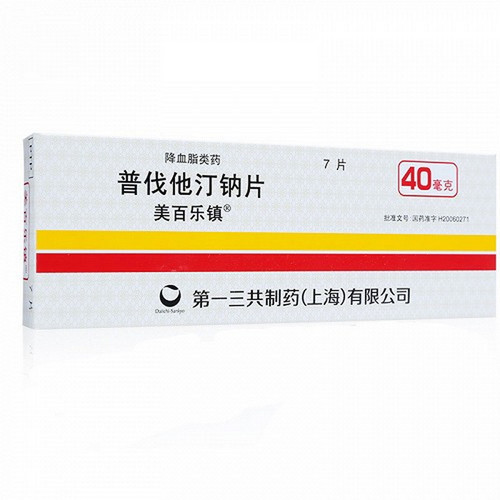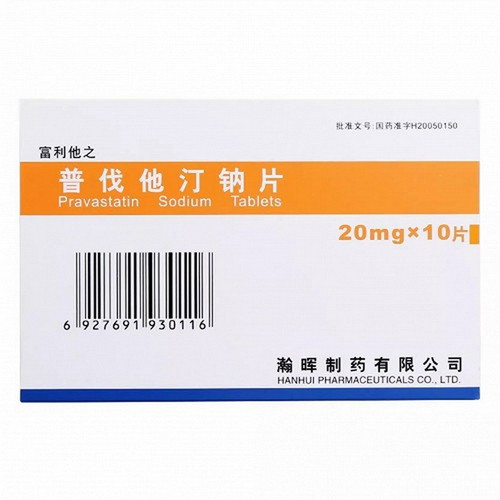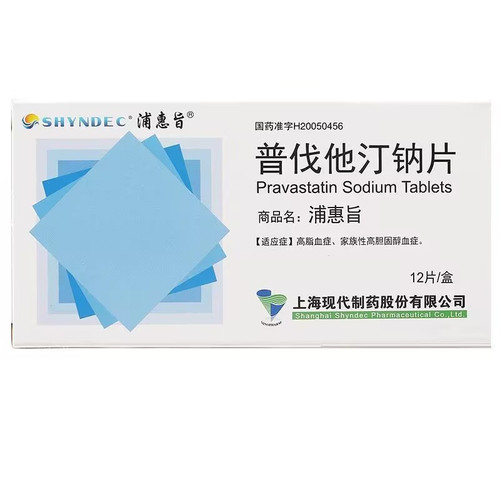Product Overview
[Drug Name]
Generic Name: Pravastatin Sodium Tablets
Trade Name: Meibai Lezhen
English Name: Pravastatin Sodium Tablets
Chinese Pinyin: Pufatatingna Pian
[Ingredients]
Pravastatin sodium. Molecular formula: C23H35NaO7, molecular weight: 446.52.
[Properties]
Reddish bare tablets with a crosshatch pattern on one side, odorless, slightly bitter.
[Indications]
Hyperlipidemia, familial hypercholesterolemia.
[Dosage and Administration]
The starting dose for adults is 10 mg to 20 mg once daily, taken at bedtime. The maximum daily dose is 40 mg.
[Adverse Reactions]
Adverse reactions may include mild transaminase elevation, rash, myalgia, headache, chest pain, nausea, vomiting, diarrhea, and fatigue.
[Contraindications]
This product is contraindicated in patients with allergies, active hepatitis, or persistently elevated liver function tests, as well as in pregnant or lactating women.
[Precautions]
1. Poor efficacy for homozygous familial hypercholesterolemia.
2. Liver function tests should be performed regularly during treatment. If SGPT and SGOT levels are elevated equal to or exceed three times the upper limit of normal and persist, treatment should be discontinued.
3. Use with caution in patients with a history of liver disease or alcohol consumption.
4. Lipid-lowering drugs such as HMG-CoA reductase inhibitors may occasionally induce elevated levels.
[Special Population Use]
Precautions for children: Not yet established.
Precautions for pregnancy and lactation: Contraindicated in pregnant and lactating women.
Precautions for the elderly: Elderly patients should consider the possibility of decreased renal function due to advanced age. Regular renal function tests should be performed, symptoms should be monitored, and medication should be administered with caution.
[Drug Interactions]
When this drug is administered one hour before or four hours after taking cholestyramine, or one hour before taking colestipol and a standard meal, its bioavailability and therapeutic effect are not clinically significantly reduced. However, if either of these two drugs is taken concomitantly, the bioavailability of this drug decreases by 40% to 50%. When used in combination with antipyrine, this product does not affect the clearance of antipyrine by the cytochrome P450 system. Since this product does not induce hepatic drug-metabolizing enzymes, it does not significantly interact with other drugs metabolized by the cytochrome P450 system (such as phenytoin and quinidine). When used in combination with warfarin, this product's steady-state bioavailability parameters do not change, nor does it alter warfarin's plasma protein binding. Long-term use of these two drugs does not alter the anticoagulant effect of warfarin. Interaction studies with aspirin, antacids (administered one hour before this product), cimetidine, gemfibrozil, niacin, or probucol did not reveal significant differences in its bioavailability. While antacids and cimetidine may alter its plasma concentration, this does not affect its efficacy. No significant interactions have been observed with diuretics, antihypertensives, digitalis, AT-converting enzyme inhibitors, calcium channel blockers, beta-blockers, or nitroglycerin.
[Pharmacological Action]
It is a competitive inhibitor of 3-hydroxy-3-methylglutaryl coenzyme A reductase (HMG-CoA reductase), the rate-limiting enzyme in the initial stages of cholesterol biosynthesis. It reversibly inhibits HMG-CoA reductase, thereby inhibiting cholesterol biosynthesis. Its lipid-lowering effects are twofold. First, by reversibly inhibiting HMG-CoA reductase activity, it reduces intracellular cholesterol levels to a certain extent, leading to an increase in the number of low-density lipoprotein (LDL) receptors on the cell surface, thereby enhancing receptor-mediated LDL catabolism and LDL clearance from the blood. Second, it inhibits the synthesis of very low-density lipoprotein (VLDL-C), the precursor of LDL, in the liver, thereby inhibiting LDL-C production.
[Storage] Store in a dark, airtight container.
[Strength] 20 mg
[Packaging] 20 mg x 7 tablets/box.
[Validity Period] 36 Months
[Approval Number] National Medicine Standard H20040101
[Manufacturer] Daiichi Sankyo Pharmaceutical (Shanghai) Co., Ltd.








